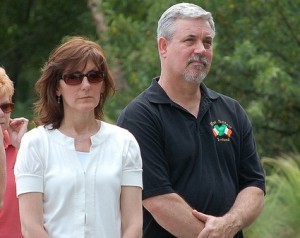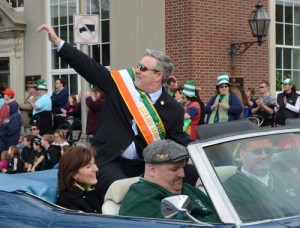
Liz and Pearse Kerr
As a Catholic and a nationalist living in the Cliftonville neighborhood of North Belfast in the late 1970s, young Pearse Kerr was accustomed to being treated with suspicion and contempt—and often brutality. Orangemen forced his family out of their first home, threatening to burn it down. Out on the streets, British soldiers frequently stopped, questioned and searched him, even though they knew him by name and had stopped and questioned him many times before. Once, on his first day of high school, a soldier struck him with a rifle butt, knocking him over a wall.
He wasn’t even surprised when, in the early morning hours of August 18, 1977, British soldiers smashed the door of his house at 233 Cliftonville Road, rousted him out of bed and hustled him off to Castlerea Interrogation Center. Nor was he surprised by his treatment once he got there. “It might sound bad, and it was,” he says. “”They broke my wrist, dislocated my neck, fractured a rib, choked me unconscious, and generally pushed me around… It was nothing out of the ordinary at the time. They beat me pretty good … but they didn’t kill me. It was well-known what was going on. It wasn’t shocking or anything. It was just part of life over there.”
Kerr spent three months in custody. He was in Castlerea Interrogation Center for seven days, then transferred to Crumlin Road Prison. All told, he was incarcerated from August 18 to November 26. Unlike many prisoners of the time, Pearse Kerr—named after the Irish nationalist and leader of the 1916 Easter Rising Pádraig Pearse—was an American. His parents Brendan and Betty Kerr, originally from the Falls Road in Belfast, had moved to Philadelphia in 1957. Pearse was born not long thereafter at Temple University Hospital. Given his status as a U.S. citizen, Kerr’s imprisonment triggered a huge backlash in the Philadelphia Irish community, and he was released thanks to the intervention of Daily News columnist Jack McKinney and Northeast Philadelphia Congressman Joshua Eilberg.
Kerr’s harrowing story, together with his continued activism here after his return to the States, rarely fails to move people who come to know him. Evidently, Kerr’s experience caught the attention of the committee organizing the 2011 Burlington County St. Patrick’s Day Parade. They recently named him their grand marshal.
Arguably, given that St. Patrick’s Day represents all things Irish, it was a good choice. Few local people could better symbolize Irish pride.
In Kerr’s household, that pride always came first. While living in the States, his father was one of the founding members of Irish Northern Aid and was active in Clan na Gael, another Irish republican organization.
“I was brought up with an Irish nationalist mindset, he says. “There’s no taking that away.” He also knew well that his first name stood for something. (It certainly meant something to the British in Belfast, he says. “When that’s your name, spelled like that, they know exactly who you are.”)
For Kerr, his time in prison left no lingering scars, but it did affect the way he looked at life: “It was maybe a solidification of what I was always taught.”
He also knows how lucky he was. Many prisoners were not nearly so fortunate. Even at the time of his release, he was uncertain what fate had in store for him. His jailers entered his cell, tossed a bag at him and ordered him to pack his clothes.
“Nobody said to me, you’re getting released,” he recalls. I thought I was being sent to Long Kesh (site of the 1981 Hunger Strike). They took me to a court in the city center. When I got to the courtroom, I was standing in the dock and, out in the foyer, I could see my father. And I knew I was going to be released.
“We got a taxi and we went to my grandmother’s house. The following day I flew to Philadelphia for a “Free Pearse Kerr” rally … which I had the pleasure to attend.”
Even though he has been in the States for years, the experience still resonates, and his Irish pride continues to make itself known through his many local activities, including Ancient Order of Hibernians Division 25.
That’s why the Burlington County honor means so much to him.
“I had no idea. I didn’t know I was in the running,” he says. “I was shocked, I really was. It’s such an honor to be chosen. I love Ireland and I love the AOH and I love the Irish republican movement. To be able to represent all that means the world to me.”


